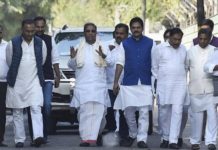The US Attorney General, Jeff Sessions, has come under fire recently over ties he had to Russia during Trump’s campaign. The former Republican Alabama U.S Senator assumed the office of the Attorney General on February 9, 2017, after he survived a partisan vote of, 52 to 47 after the Republicans decided to fully support their own to become the nation’s next attorney general.
On January 10, 2017, Jeff Sessions attended his confirmation hearing that was held by the Senate Judiciary Committee. Under oath, he said that he did not communicate with the Russians during the last campaign period in 2016.
At the hearing, the Democrat U.S Senator of Minnesota, Sen. Al Franken asked him, “if there is any evidence that anyone affiliated to the Trump campaign communicated with the Russian government in the course of this campaign what will you do?”
“I am not aware of any of those activities,” Sessions responded. “I have been called a surrogate at a time or two in that campaign, and I did not have communications with the Russians, and I’m unable to comment on it.” He added.
Sen. Patrick Joseph Leahy (Vermont) asked Sessions to answer written questions. “Several of the President-elect’s nominees or senior advisers have Russian ties. Have you been in contact with anyone connected to any part of the Russian government about the 2016 election, either before or after election day?”
Sessions had a simple response: “No.”
In contrast, Justice Department officials confirmed to the Washington Post that Sessions spoke to Sergey Kislyak twice in 2016. Kislyak is the Russian ambassador to the US. Sessions held one of the appointments at his office in private with Kislyak in September, at a time when the U.S Intelligence officials claimed that the Russians were trying to overturn the presidential race between Trump and Clinton.
The open information could instigate more calls by the members of Congress to appoint a special counsel to look into the alleged part that Russia played in last year’s general election under a microscope. The Justice Department and the FBI, the main bodies that have been spearheading the investigations into the Russian involvement in last year’s presidential election and any ties they had to the Trump’s campaign team, are monitored by the Attorney General (Sessions).
July and September were the months Sessions and Kilsyak met. At the time, he was a high-ranking member of the authoritative Armed Services Committee, and he was also one of Trump’s trusted advisers on foreign policy. After joining Trump’s campaign team formally on February 28, 2016, he played a key role in supporting Trump.
The editor in chief of Lawfare blog, Mr. Benjamin Whites, mentioned on Twitter that, Session might not be charged with perjury as there’s not enough evidence. He continued to argue that, “the situation is too ambiguous as to whether he was meeting him in senatorial or Trump campaign capacity.” If Sessions was answering the senators’ questions in the context of his work as a key player in Trump’s campaign alone, then he could say that his duties as a senator were a new thing entirely.
Sarah Isgur Flores, who is Sessions spokesperson said, “There was absolutely nothing misleading about his answer.” She then added,” Last year the senator had over 25 conversations with foreign ambassadors as a senior member of the Armed Services Committee, including the British, Korean, Japanese, Polish, Indian, Chinese, Canadian, Australian, German and Russian ambassadors. He was asked during the hearing about communications between Russia and the Trump campaign, not about the meetings he took as a senator and a member of the Armed Services Committee.”
Sessions later issued a statement on Wednesday 1, saying he “he never met with any Russian officials to discuss issues of the campaign. I have no idea what this allegation is about. It is false.”
Sessions might have met with Kislyak as an Armed Services Committee member, but he denied under oath, of having any communication with the Russians. Sessions was asked whether he had communicated with the Russians not as a part of Trump’s campaign but if he had met them before regardless of the purpose of the meeting. This shows that Sessions did not seem to understand the weight of his allegations.
However, an official from the Justice Department came to Session’s rescue when he said that recollecting what was said is difficult.
The Russian ambassador remained mum when asked to comment about his appointments with Sessions.
All Senate Armed Services Committee members (26 of them) were contacted by the Washington post to try to determine whether they met Kilsyak last year. 20 Senators out of the 26 responded, and every lawmaker including the committee’s chairman, John McCain, confirmed they did not meet with Kilsyak in 2016.
A senior Armed Services Committee member of staff said that the members were reluctant to book appointments with the Russian ambassador due tension the nation’s ties to Moscow.
Last month, former national security adviser to Trump, Michael Flynn, was forced to resign after he discussed U.S sanctions against Russia with Kilsyak privately. These discussions took place during the month before the President took office. The alleged discussions were not taken well by some senior government officials who thought it was inappropriate and unlawful. The lifting of sanctions placed against Russia by the Obama administration for meddling with the concluded 2016 elections, would be a violation of the Logan Act. The law bans making of foreign policy by people outside the executive arm of the U.S government.
President Trump has come out in support of his attorney general claiming he did not say anything wrong, amid calls by some of the Democrat lawmakers urging sessions to resign.
Nancy Pelosi, the House minority leader, was quoted saying,” After lying under oath to Congress about his own communications with the Russians, the attorney general must resign. Sessions is not fit to serve as the top law enforcement officer of our country and must resign. There must be an independent, bipartisan, outside commission to investigate the Trump political and financial connections to the Russians.”
In response, Trump called the opposing Democrats “hypocrites”. He also tweeted a photo Chuck Schumer, Senate minority leader, enjoying some doughnuts with the Russian President Vladimir Putin. He said in his tweet, “We should start an investigation into @SenSchumer and his ties to Russia and Putin. A total hypocrite!”




